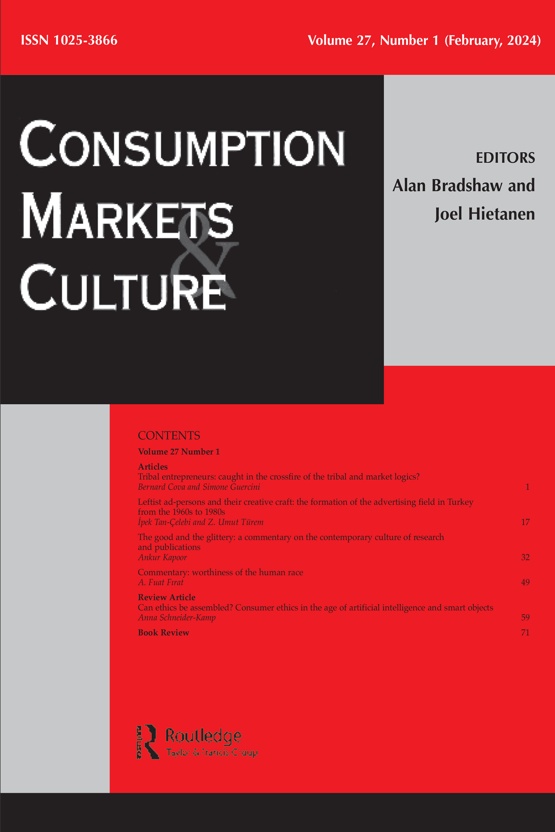Submit a Manuscript to the Journal
Consumption Markets & Culture
For a Special Issue on
From Globalisation To Multipolarity?: Advancing Non-hegemonic Perspectives in Marketing
Manuscript deadline
21 January 2025

Special Issue Editor(s)
Marcus Hemais,
Pontifical Catholic University of Rio de Janeiro
[email protected]
Olga Kravets,
Royal Holloway University of London
[email protected]
From Globalisation To Multipolarity?: Advancing Non-hegemonic Perspectives in Marketing
“A multipolar world’ is the phrase we hear more and more these days and, almost always, it is evoked contra “globalization,” a much-debated idea of transformation of global order towards greater integration and interdependence (Steger 2009). In recent years, “globalization” has lost some of its former buzz and ideological purchase, yet in this special issue we wish to focus on the concept precisely as the new visions of globality purportedly are set to take its place. Our aim is to invite critical reflections on globalization, its forms, values, and processes, in the context of marketing theory and practice and invite speculations on marketing in a post-global world and from within the emerging non-hegemonic perspectives.
Ever since the 1990s, when the discourse of globalization came to dominate the pages of The Economist, The Financial Times, and such, the idea has been described as “contested” (ibid.) For some, globalization meant a promise of great societal development through the advancements of neoliberal capitalist markets on a global scale (Dunning, 2003). In their view, market integration was essential not only to foment economic prosperity worldwide, but also to tackle globally important social problems, such as gender discrimination, racism, and poverty (Bhagwati, 2004). For others, globalization was “imperialism” by another name (Harvey, 2003), imposing a one-size-fits-all Eurocentric market development program upon diverse peoples and cultures, often with a non-capitalist orientation (especially in the Global South) (Santos, 2000). With a narrative of equality, globalization was to eliminate “dissonant” socio-cultural-governmental differences (Steger, 2009), thus, promoting the frictionless flow of finances and resources to the hegemonic West and subalternizing the ways of being and thinking not aligned with capitalist principles (Mignolo, 2021).
Marketing scholarship fell into the similar polarity in approaching globalization. On the one hand, in the “globalized” world, marketing academia believed that “Knowledge of marketing is universal. Marketing is marketing – everywhere” (Baker, 2005: 8; emphasis in original). That is, marketing was imagined not only leading the diffusion of neoliberal market principles and evidencing their claim (e.g., equality via consumer choice) but also being universalized by them (Firat 1996; Dholakia et al 2021). Such view was helped by the fact that the field conceptualized itself as free of ideologies, more worried with corporate and societal issues than with geopolitics (Eckhardt, Dholakia & Varman, 2012) - as if the former could be detached from the latter. On the other hand, critical scholars acknowledged the discontents of globalization, the non-Eurocentric realities, and the fragmented nature of the global markets (Firat 1996). They pointed out the spaces where alternative and/or hybrid forms of global integration flourished, as well as spaces of resistance to neoliberal global market forces (e.g., Ger & Belk, 1996; Venkatesh, 1995). As important as these critical works were to raising awareness of the need for non-hegemonic perspectives, in the end, they could only go so far in tackling the epistemic domination of the Global North as the main (and only) reference in marketing (Varman, 2019).
Following anti-globalization struggles and movements against the excesses of global neoliberal restructuring, market fundamentalism, and (neo)colonial extractivism, new lines of critique emerged from geographies outside of the Global North. They questioned the Westernized episteme of the discipline and initiated debates from beyond the old Eurocentric hierarchies that validate what is acceptable knowledge in marketing (e.g., Kravets & Varman, 2022). The novel perspectives, that drew on the epistemologies from the Global South, sought to illuminate how failures in marketing affect the realities of subalternized loci (Bádéjo & Gordon, 2022; Hemais, Pessôa & Barros, 2022; Silva & Sauerbronn, 2021). Beyond interrogating the role of marketing in globalization, these works countered the fundamental neo-colonial orientation of marketing, underpinned by the belief that capitalist market benefits peoples around the world (Kotler 2020).
This Special Issue aims to extend these lines of inquiry and invites scholars to discuss globalization and marketing and their discontents from non-hegemonic perspectives. We welcome works that explore how marketing is implicated in the current (re)configuration of global interconnections, interdependencies, and inequalities. We are looking for works on the following topics (but not limited to these):
- marketing and globalization: a decolonial take;
- foundational marketing concepts and non-hegemonic perspectives;
- subjugated and disqualified knowledge in marketing and consumer studies;
- marketing in the multipolar world: new directions;
- moral challenges and imperatives of marketing in a post-global world;
- decolonizing marketing pedagogy.
Looking to Publish your Research?
Find out how to publish your research open access with Taylor & Francis Group.
Choose open accessSubmission Instructions
Authors are encouraged to submit empirical and conceptual papers in a range of formats, including commentaries, interviews, provocations, and reviews with a limit of 8,000 words. Other experimental formats are also encouraged and may be proposed to the special issue editors.
All submissions will undergo double-blind peer review. Authors are encouraged to refer to the Consumption Markets and Culture guidelines for formatting and references.
Potential submitters are welcome to contact the Special Issue Guest Editors Marcus Hemais ([email protected]) or Olga Kravets ([email protected]) regarding the expression of interest and questions about expectations, requirements as well as questions about alternative formants or any further queries.